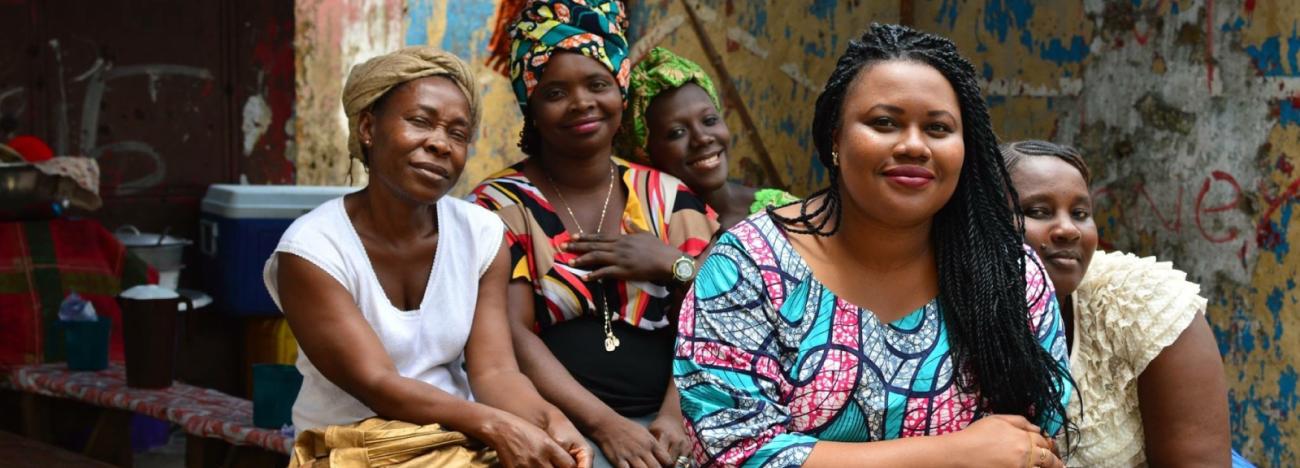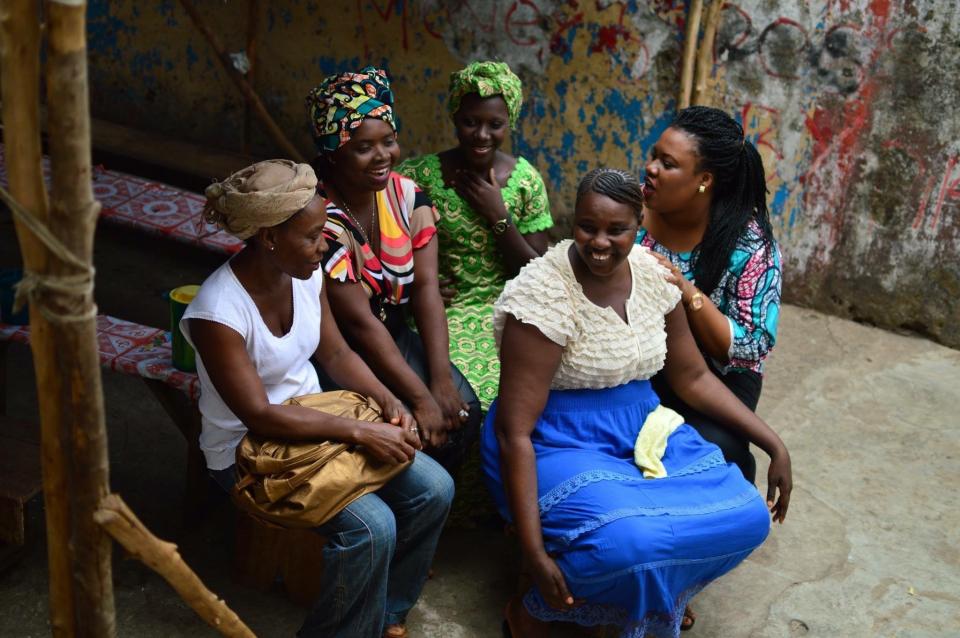The Wake
When Fatou Wurie, BA’10, returned home to Sierra Leone in 2011, after two decades of living abroad, there was one person she wanted to see more than anyone else: her grandmother.
“She was strong. She was feisty. She was the matriarch of our family, and she had raised me up until age three,” said Wurie in April, when she spoke about her experience at a live storytelling event (Moth Mainstage) held in London, UK. She had not returned to Sierra Leone since the early 1990s, when civil war engulfed the country. In the interim, her grandmother would record traditional songs and send them to Wurie and her family.
“I ran towards [my grandmother] and just hugged her and inhaled her scent and felt finally like I was home,” recalled Wurie, who grew up in 10 countries as her father worked in various posts for the United Nations.
The momentous reunion was brief. Within three months of Wurie’s return to her homeland, her grandmother died. Wurie and her mother rushed to her grandmother’s home, but, when they arrived, Wurie was shut out of the room where her grandmother’s body lay because of an earlier choice her grandmother had made.
Her grandmother decided that that Wurie would be the first woman in her family not to undergo bondo -- or female genital mutilation (FGM). Consequently, she is not a “society woman” and was forbidden from participating in important funeral rituals, including the preparation of her grandmother’s body for burial.
“Her decision meant I was now on the other side of the door,” said Wurie, an open and gregarious storyteller with a soulful voice, to the 900-strong audience in London. “And for the first time since coming home, I felt like an outsider.”
An ardent liberal feminist who had majored in gender studies at UBC, Wurie had to reckon with her grandmother’s role in a practice widely viewed as “backward” and “anti-women.”
The events that followed spurred Wurie to think critically about her grandmother’s decision and her role as a high-ranking sowei, or “cutter,” responsible for initiating girls in her community into womanhood through rituals involving FGM, which the World Health Organization defines as “procedures that intentionally alter or cause injury to the female genital organs for non-medical reasons.” An ardent liberal feminist who had majored in gender studies at UBC, Wurie had to reckon with her grandmother’s role in a practice widely viewed as “backward” and “anti-women.” The process transformed how she understands women’s health as an activist and development worker today.
FGM has proven challenging for activists and development workers to eradicate in Sierra Leone, where it is carried out by female-only secret bondo societies believed to be linked to the spirit world and led by soweis, like Wurie’s grandmother. Nearly nine out of 10 women in the country have undergone FGM, which ranges from partial removal of the clitoris to the removal of all external genital organs, and can have serious consequences for reproductive health. Yet many locals believe the rite improves a woman’s fertility and prepares her for marriage.
Girls’ families, who often view the initiation as a source of prestige, pay soweis as much as the value of a year’s harvest for their services, according to a 2010 article in the Harvard Human Rights Journal. The soweis are also feared, respected and believed to possess supernatural powers. They hold so much influence over the female vote that ending FGM is a taboo topic for the political elite. Some efforts by outsiders to eradicate FGM have been perceived as an assault on local culture and only served to entrench the practice. A 2015 article in the UK’s Guardian newspaper reported that soweis, concerned about losing the power and money they gain through the system, have been especially resistant to change. Some members of bondo societies have even kidnapped girls, forced them to undergo FGM, and demanded their families pay for the service.
Given their role in perpetuating FGM, it’s easy for outsiders to judge these societies in a wholly negative way, yet they are an important part of Sierra Leonean culture and there is another, more positive, side to them that is lesser-known – a side that became increasingly apparent to Wurie the more time she spent in the county.
Women and girls in Sierra Leone have limited rights. Four out of 10 are married by the time they are 18 and many become pregnant as children in a country that is the most dangerous place in the world to give birth. Sierra Leone has struggled to rebuild its healthcare system since the end of the civil war in 2002, and an estimated 1,360 mothers die per 100,000 live births. Women and girls also struggle to access education and economic opportunities. Six out of 10 females aged 15 or older were illiterate in 2015, according to data from the United Nations Educational, Scientific and Cultural Organization.
Women and girls in Sierra Leone have limited rights. Four out of 10 are married by the time they are 18 and many become pregnant as children in a country that is the most dangerous place in the world to give birth.
In this context, the secret societies offer important benefits for women. They provide social spaces independent from the patriarchal system that dominates Sierra Leone. Members congregate for initiations and major life events, giving women a source of kinship in a place not constricted by men. Such society meetings are the only place a woman can go without her husband’s permission.
When Wurie observed seven days of rituals for her grandmother’s funeral, the importance of the bondo societies for women in her community began to sink in. In the months that followed, she began to understand the issue of FGM within the complex social context of Sierra Leone.
“The night of the wake, it was so beautiful. All the soweis from around the chiefdom came to my grandmother’s house and they spent the whole night singing, dancing, drinking,” recalls Wurie, who has a penchant for poetry and often speaks in sentences with cadence. Through their songs, the women are “able to express all their pain, they’re able to talk about the man that left them, they’re able to talk about the child that isn’t there anymore.
“I was forced to quiet my judgement. Take a step back to bear witness, listen to stories and respect the power of sisterhood, secrecy, support and most importantly LOVE that held these women together,” Wurie explained in an essay for the Huffington Post.
But on stage in London she described another moment at her grandmother’s wake when she learned seven girls would undergo bondo before her grandmother was laid to rest. “For us to bury your grandmother in peace,” Wurie’s aunt explained. The information hit Wurie with a rush of emotions, as she wondered how she could honour her culture and love for her grandmother, while staying to true to her feminist values.
“Being shut out and not being able to participate in the ritual of burying [my grandmother] like I wanted to really humbled me,” said Wurie, who went on to spend five years working on women’s health in Sierra Leone before pursuing a master’s degree in Public Policy from the University of Oxford.
Though she doesn’t think FGM “has a place in today’s society,” Wurie believes it will only stop in Sierra Leone if local women and their societies end it. It’s not going to change because of a foreign anti-FGM campaign, said Wurie. “I don’t like when we talk about bondo in a way that feels very exposé-esque and very much from a Western perspective.”
Her thinking is in line with changing practices in anti-FGM work, which is increasingly focused on driving change from within communities. One particularly successful project focused on community engagement is run by Tostan, a non-governmental organization based in Senegal. Their projects convinced more than 7,200 rural communities in Djibouti, Gambia, Guinea, Guinea-Bissau, Mali, Mauritania, Senegal and Somalia to publicly declare they would abandon FGM and child marriage, according to a July 2017 report by Data2X, an advocacy group that analyzes gender data. Tostan’s initiative succeeded precisely because it enabled communities to come to their own conclusions about the practices during a 30-month community education program, the report said. The program focuses on group sessions with men, women and adolescents in which they discuss social norms, including ones driving FGM, by participating in exercises and games that are filled with local proverbs, songs and dances.
Wurie believes FGM will only stop in Sierra Leone if local women and their societies end it.
Because of the secret nature of bondo societies, it would take even longer for this type of anti-FGM campaign to be successful in Sierra Leone, according to a 2010 article in the Harvard Human Rights Journal.
In Wurie's eyes, honouring the agency and beliefs of women, regardless of what they might be, is an important element of creating change. “We need to start looking at women more holistically and look at the structures that perpetuate [women’s right problems],” she said. If Sierra Leone tackles problems like a lack of access to quality education, healthcare, and economic independence, women would have more opportunities and FGM would die out. The problem is “bigger than bondo,” according to Wurie – a patriarchal system holds girls back.
At the same time, she is acutely aware that it was her grandmother – a high-ranking sowei – who decided that she and her younger sisters would be the first women in their family and community not to undergo the initiation into the society. “She [my grandmother] could get away with it,” said Wurie, who believes her grandmother had a “wise understanding” they were growing up with “different opportunities” and describes the decision as a “gift.”
Wurie now aims to do work that helps other women access different opportunities and view their lives on different terms. Her career plans are spurred by stories of Sierra Leonean women who dealt with a cholera outbreak, severe floods that displaced thousands and, starting in 2014, an Ebola outbreak that Wurie describes as “the final push” – after surviving a civil war.
She worked in Freetown as a gender and communications specialist for the United Nations Mission for Ebola Emergency Response, but grew frustrated when no special attention was paid to female survivors. Most had little education and had become breadwinners after losing family members to the disease. To help them, Wurie established the Survivor Dream Project, which offers psychosocial support and other assistance as they attempt to make sense of their experience – their stories – and figure out how to move forward with their lives. Twenty survivors have passed through the program so far.
Wurie now plans to earn a doctorate in public health focussed on mental health, with the aim of integrating psychosocial support into women’s health projects in developing countries to help them overcome trauma. Such efforts, she hopes, would include storytelling in which women in the global South rethink their own opportunities, their rights and the factors holding them back. In this way, she would help create new spaces from which women could draw power and opportunity.
“I think if you change the structures, women would have the opportunity to dream,” she says. “Women would ask for more.”


































